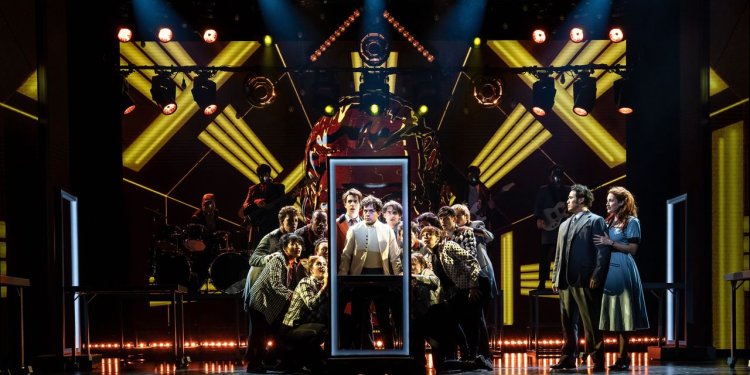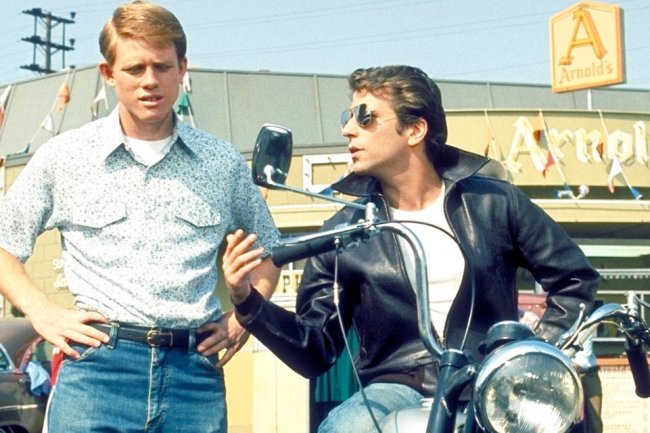‘The Who’s Tommy’ and ‘Another Marriage’ Reviews: Pinball Wizards, Coupled Writers
In Chicago, Des McAnuff directs a revival of his and Pete Townshend’s musical about that deaf, dumb and blind kid; Judy Greer and Ian Barford play literary wife and husband in a play by Kate Arrington Ali Louis Bourzgui (center) and the company of ‘The Who's Tommy’ Photo: Liz Lauren By Charles Isherwood July 6, 2023 5:48 pm ET The new production of “The Who’s Tommy” at the Goodman Theatre here is being billed as a “reinvention” of the show, first staged in 1992 in La Jolla, Calif., and subsequently seen on Broadway. Resurrection is probably a more appropriate term, since the latest version of the musical, or rock opera, has much in common with the original, including its Tony-winning director, Des McAnuff, who also co-wrote the book with Pete Townshend, the composer and lyricist, and a founding—and current—m


Ali Louis Bourzgui (center) and the company of ‘The Who's Tommy’
Photo: Liz Lauren
The new production of “The Who’s Tommy” at the Goodman Theatre here is being billed as a “reinvention” of the show, first staged in 1992 in La Jolla, Calif., and subsequently seen on Broadway. Resurrection is probably a more appropriate term, since the latest version of the musical, or rock opera, has much in common with the original, including its Tony-winning director, Des McAnuff, who also co-wrote the book with Pete Townshend, the composer and lyricist, and a founding—and current—member of the band.
The Who’s Tommy
Goodman Theatre, 170 N. Dearborn St., Chicago, $40-$215, 312-443-3800, closes Aug. 6
However it is described, the show is visually dazzling, musically rich and dramatically propulsive—much as the original was. And, of course, the story remains the same, a gothic fantasy drawn from the Who’s 1969 concept album that later became a lushly cast movie—Ann-Margret, Oliver Reed, Elton John, Jack Nicholson, Tina Turner!—directed by Ken Russell. (One of his better movies, although that does not qualify as high praise.)
In some ways it was a prescient tale of an extreme case of post-traumatic stress disorder, before that term was in common use. The title character is a young boy who witnesses his father kill his mother’s lover. (In the movie, victim and murderer were reversed.) In their frantic fear, his parents sing in chilling harmony one of the show’s many gripping songs, urging the boy: “You didn’t hear it, you didn’t see it, you won’t say nothing to no one ever in your life.” The tyke takes note, and is instantly rendered “deaf, dumb and blind.”
Mr. Townshend’s conceit was also ahead of its time in its frank depiction of the vicious child abuse that Tommy suffers, with his lecherous Uncle Ernie (a vividly sleazy John Ambrosino ) molesting him, and his sadistic Cousin Kevin (Bobby Conte, merrily malignant) subjecting him to various tortures. Then there’s the rather vaguer exposure to the Acid Queen ( Christina Sajous, doing a creditable job of blurring vivid memories of Turner in the movie).

Christina Sajous
Photo: Liz Lauren
Tommy is played by different actors at three different ages, but it is Ali Louis Bourzgui as the older character, interacting with the younger ones, who has the primary role, and sings with vibrancy and scorching earnestness as Tommy grows to become a tabloid-worthy freak when he evinces a miraculous gift for playing pinball.
In this regard the show reveals its age, since pinball machines are hardly the barroom fixtures they once were. Today Tommy would be a videogame genius, but you can’t stage this show without its rousing first-act finale, “Pinball Wizard.” (“PlayStation Wizard”? No.)
More Theater Reviews
- ‘Hamlet’ Review: Shakespeare in the Park With a Modern Twist June 29, 2023
- ‘Once Upon a One More Time’ Review: Princesses With (Britney) Spears June 22, 2023
- ‘The Doctor’ Review: Complex Symptoms of a Moral Dilemma June 15, 2023
- ‘Days of Wine and Roses’ Review: The Intoxicating Decline of a Marriage June 8, 2023
The characters, including the cryptic Tommy, are thinly drawn, sometimes little more than grotesque caricatures, but the show makes up in vivid incident what it lacks in psychological depth. And while there is a dramatic falloff in the second act, after Tommy regains his faculties and becomes a cultish pop figure, Mr. McAnuff’s dynamic staging doesn’t leave much time to reflect on flaws.
The original was inventive in its use of visual effects, but this version takes advantage of the far more sophisticated theatrical technology of today, becoming a series of spectacular vignettes drawing on sophisticated projections by Peter Nigrini, complemented by David Korins’s transfixing set designs.
Above all, “The Who’s Tommy” boasts irresistibly catchy songs, from young Tommy’s plaint “See Me, Feel Me” to his rousing anthem “I’m Free” and the concluding chorus “Listening to You.” It’s a pop-rock score that, once heard, is not forgotten. Its reinvention—or resurrection, or reawakening—in this polished production is a welcome reminder of its enduring appeal.
***
***
“Another Marriage,” a new play at the Steppenwolf Theatre is—surprise—another play about a union that goes sour. Nevertheless it is well-written and pleasingly twisty, marking an accomplished playwriting debut from the Steppenwolf acting ensemble member Kate Arrington.

Ian Barford and Judy Greer
Photo: Michael Brosilow
Another Marriage
Steppenwolf Theatre, 1650 N. Halsted St., Chicago, $64-$98, 312-335-1650, closes July 23
The principal characters are Sunny and Nick, who meet in college in highbrow fashion, discussing Henry James, at least until Nick, desperate to make an un-Jamesian impression, strips naked as snow falls. A meet-cute, but a new one. The story of Sunny and Nick’s marriage, as enacted by the terrific Judy Greer and Ian Barford, follows a wayward and moving trajectory.
Both are aspiring writers, but Nick finds success before Sunny does, becoming a popular highish-brow novelist, while she is sidelined by motherhood and its demands. A particularly trenchant scene finds Sunny understandably irritated, if not outraged, by the discovery that Nick has paid to publish her book; he, thinking that it was a generous gesture, is bewildered by her reaction.
Ms. Greer gives a performance of superb clarity and emotional truth; Sunny greets with stunned incomprehension the discovery that Nick has fallen in love with a young admirer, Macassidy (
Caroline Neff, excellent in this and a few smaller roles). Moving ahead—the play’s trajectory covers more than two decades—even more affecting is how Sunny and Macassidy find a certain mutual sympathy in their dissatisfaction with Nick as husband material, despite the complicated nature of their relationship.Directed with subtlety and briskness by Terry Kinney, also a longtime Steppenwolf ensemble member, the play finds affecting new turns in the now-familiar story of a marriage broken apart by the Other Woman. It may be trodden territory, but Ms. Arrington finds interesting new angles to explore.
—Mr. Isherwood is the Journal’s theater critic.
What's Your Reaction?













